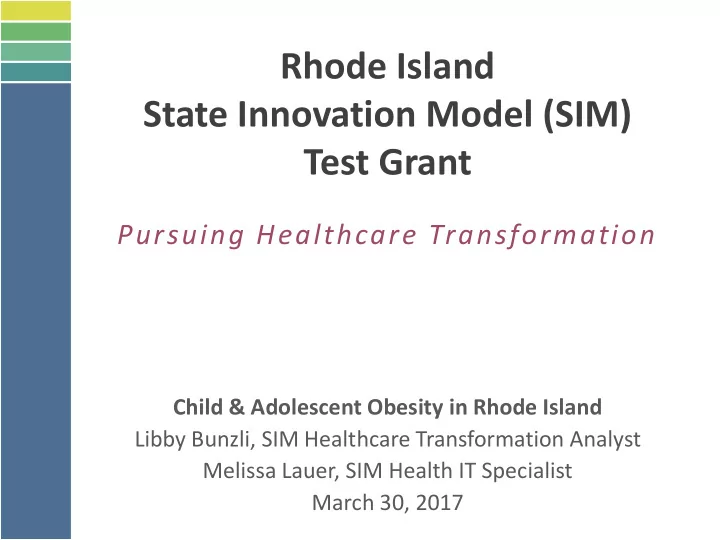

Rhode Island State Innovation Model (SIM) Test Grant Pursuing Healthcare Transformation Child & Adolescent Obesity in Rhode Island Libby Bunzli, SIM Healthcare Transformation Analyst Melissa Lauer, SIM Health IT Specialist March 30, 2017
SIM Background • $20 million grant from the Centers for Medicare and Medicaid Services (CMS) • Transforms the way we deliver and pay for health care 2
SIM Investments SIM funds are supporting 3 categories of activities Practice & Data Capacity & Patient Workforce Expertise Empowerment Transformation Expansion Engage patients in Expand the ability of Improve primary care positive health providers and policy and behavioral health behaviors and self- makers to use and infrastructure advocacy share data Improved Population Health 3
The Ultimate Goal The Triple Aim Healthier People Better Care Smarter Spending Adapted from Institute for Healthcare Improvement, 2012 4
What is the SIM Integrated Population Health Plan? A report describing the physical and behavioral health of Rhode Islanders using 8 focus areas: SIM Health Focus Areas Chronic Serious Disease Children Mental (Diabetes, Opioid Use Maternal & with Social Obesity Tobacco Use Depression Illness (e.g. Heart Disorders Child Health & Emotional Schizo- Disease, & Disturbance phrenia) Stroke) 5
SIM Integration & Alignment Initiative SIM has committed to pursue 3 I&A Collaboration Projects Community Agencies Identification of “High Risk” BHDDH Patients to Improve Quality SIM DCYF Care Aligning Best Practices in Tobacco Assessment, RIDOH DHS Referral, and Treatment Leveraging Infrastructure for Statewide BMI Data OHIC Collection DHS/DEA EOHHS/ HSRI Health IT EOHHS/ Medicaid 6
Leveraging Infrastructure for Statewide BMI Data Collection Why Obesity? • Prevalence of childhood obesity in the US has increased from 5% in 1974 to 17% in 2014 • An estimated 27% of Rhode Island adults and 15% of high school students were obese in 2014 • Obesity is linked with many serious health conditions & key determinants
Leveraging Infrastructure for Statewide BMI Data Collection Why BMI Data? • RI does not systematically collect clinical BMI data • Height & weight data are collected at most clinical encounters • Clinical BMI data can be linked • Localized data informs public health planning
Leveraging Infrastructure for Statewide BMI Data Collection SIM approaches • Investigate approaches to BMI data capture • Engage providers and patients • Support existing data collection systems • Develop strategies to translate data into action
Next Steps • Provide support as needed to our partner agencies as they analyze samples of claims and diagnostic data • Monitor the policy landscape and support advancement in public health data collection policy
Thank you!
Recommend
More recommend